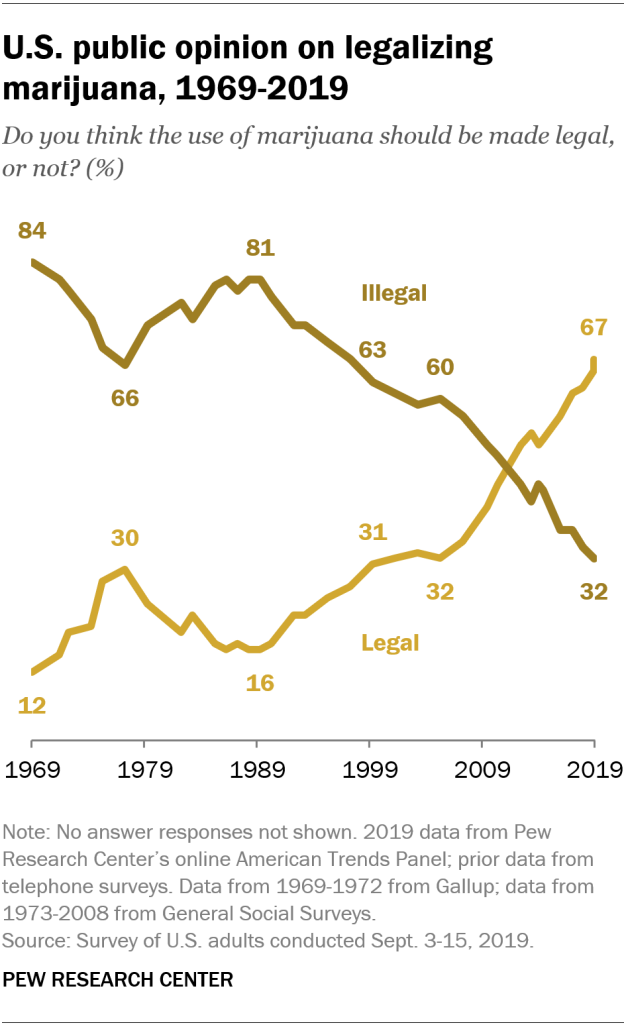Cannabis Businesses “Essential” While Arrests Grow
The relationships between marijuana, the government and legislation are complex. While we’ve come a long way from the days of the initial “war on drugs,” there is still a lack of cohesive laws among states and the federal government.
Understandably, this has made cannabis regulation challenging for most of the general public to understand. This was complicated even further by recent events when many states deemed cannabis businesses “essential” during the quarantine lockdown.
While this “essential” designation better positioned the industry for economic recovery after the COVID-19 outbreak it also brought back the question:
How is it that we’ve culturally come to accept cannabis to the extent it is now thought of as “essential” while hundreds of thousands of people are being arrested for possession, use and distribution at the same time?
How Does The General Public Feel About Marijuana?

Most Americans were in favor of keeping marijuana illegal but that was in the 1990s. Popular opinion has flipped over the last two decades, according to a Pew Research Center study from November. Now, over two-thirds of Americans favor marijuana legalization. The numbers are even higher when it comes to decriminalization, with 9 in 10 U.S. adults being proponents of either the decriminalization or legalization of cannabis.
Perhaps unsurprisingly, it’s the younger generations leading the charge for a loosening of marijuana regulations. In fact, the majority of opponents are from the “silent generation,” those born between 1928-1945.
Even as the American public has come to embrace marijuana legalization, the federal government’s marijuana laws are feeding the American prison system. Due to its classification as a “Schedule I” substance, marijuana use, possession, cultivation and distribution can still get an offender thrown in jail in many of the nation’s states.
Marijuana Arrests Are Increasing
The numbers are staggering. In 2018 alone, 663,000 people were arrested for crimes related to marijuana, rising for the third straight year in a row. Of those, 92% were for possession. 40% of all drug arrests in 2018 were for marijuana offenses. According to NORML Executive Director Erik Altieri, “Police across America make a marijuana-related arrest every 48 seconds.”
While some states with legalized or decriminalized cannabis programs are instituting programs for pardoning minor marijuana crimes, such as the Nevada governor earlier this year, the truth is that the vast majority of people who have been incarcerated for a marijuana-related offense will remain in jail to serve the sentence and keep the crime on their record after release.
What Happens To Arrests When The Laws Change?
If marijuana arrests are still increasing even as more states legalize or decriminalize marijuana, the assumption might be that legalizing cannabis has no impact on the number of people arrested for it.
A study from the National Criminal Justice Reference Center, however, disputes that. After comparing data before and after the legalization of cannabis in Washington and Oregon, the research showed that marijuana arrests began decreasing directly prior to legalization (perhaps in anticipation of the upcoming law changes) and continued after.
It is unclear why arrests are rising as legalization spreads, but one implication from this study would be that if marijuana arrests are decreasing in legalized states, they are rising in the others.
How Does This Impact The Cannabis Industry
Cannabis businesses understand that these laws and legislation impact the industry. Financing, administrative work and operations are more challenging in the cannabis industry than they are in most others.
That’s why it is imperative that we watch the public opinion of cannabis and criminal justice reforms regarding its laws. It probably goes without saying, but a country that accepts cannabis (both legally and culturally) will bolster the industry in a way that no marketing campaign ever will.
The cannabis industry changes so rapidly that it’s hard to keep up. The “essential” designation might not mean anything legally, but it signifies a greater cultural shift towards acceptance. As acceptance spreads, the industry grows and expands, yet we must push for more. Revenue increasing is no substitute for a legal and thriving industry. For this to happen, social and criminal justice reforms must grow and expand with it to decrease marijuana arrests.





